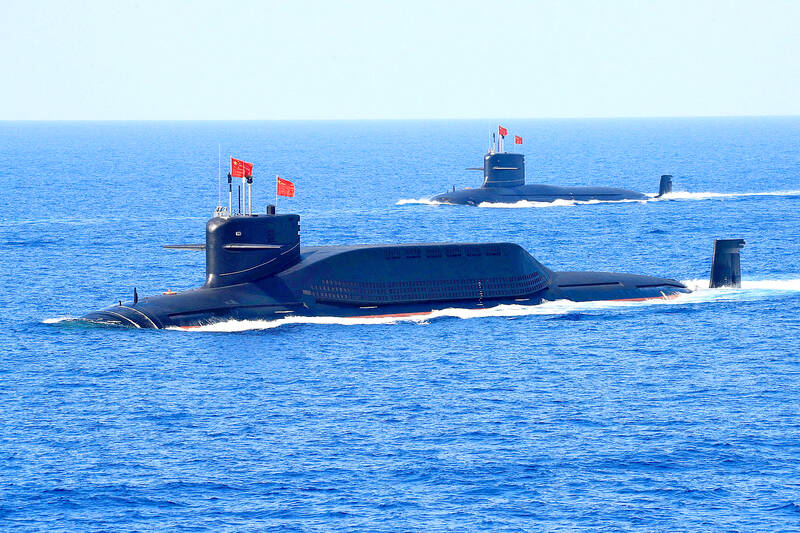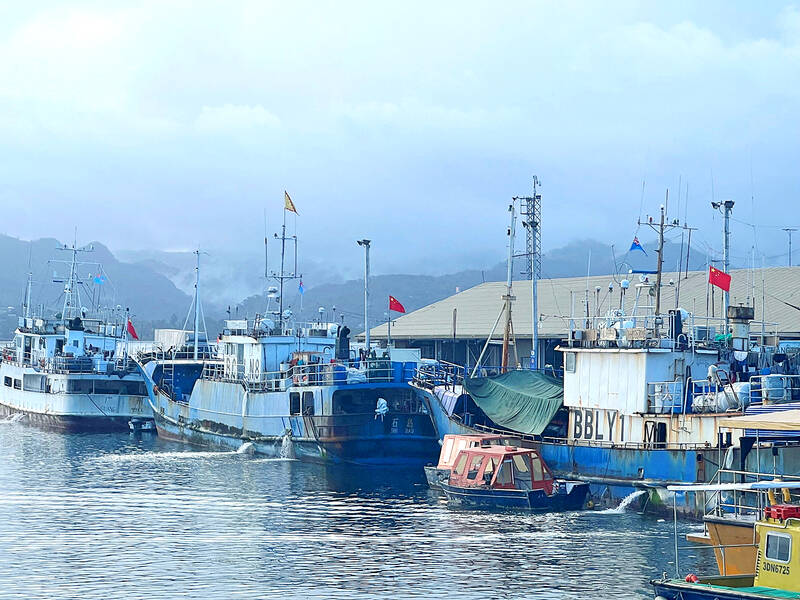As competition for influence in the Pacific region intensifies, analysis by the Guardian has mapped a vast network of security, policing and defense agreements between the island countries and foreign partners — leading to concerns about militarization of the region.
The Guardian examined agreements and partnerships covering security, defense and policing with the 10 largest Pacific countries by population. Australia remains the dominant partner in the region — accounting for more than half the deals identified — followed by New Zealand, the US and China.
The data shows more than 60 agreements and initiatives, including several infrastructure and equipment deals, to support defense and policing in Pacific countries.

Photo: Reuters
POLICING THE PACIFIC
More than half the agreements include a focus on policing, with an emphasis on training of Pacific police forces and donating equipment — a push that comes amid rising transnational crime and threats. China has emerged as a new player in this arena, having developed nearly half a dozen initiatives to support policing in Pacific countries in recent years. Almost all the Pacific countries tracked have deals with multiple partners.”
Experts have raised concerns about the militarization of the region, citing the 2022 security deal between China and Solomon Islands, and the US defense cooperation agreement with Papua New Guinea agreed a year later. Only three Pacific countries — Papua New Guinea, Fiji and Tonga — have their own militaries.

Photo: Reuters
Papua New Guinea, the largest of the Pacific nations with a population of about 10 million, draws security support and maintains ties with various partners including Australia, the US and China.
Donald Yamasombi, a deputy commissioner in the country’s police force, said “international partners are keen and are coming in.” He said police in Papua New Guinea were keen to work alongside foreign forces, particularly to combat rising methamphetamine trafficking and use in the country.
While China doesn’t have any formal policing or security agreements with Papua New Guinea, Yamasombi said he regularly seeks advice from Chinese embassy officials, particularly on how to deal with emerging crimes — such as money laundering, illegal migration and prostitution — that are a growing problem in Papua New Guinea.
“If we were to partner with China, I’d like to see it being targeted at those very crime types,” Yamasombi said. The deputy commissioner said he would welcome further collaboration with Chinese police forces, including participating in training programs.
Meanwhile, the US has at least eight defense and security agreements in place with Pacific countries. Last year, it signed a pact with Papua New Guinea that gave the US military “unimpeded” access to its bases, and in 2020, the US signed a defense and security agreement with Fiji. The US also retains its dominant military footprint in the northern Pacific through its Compact of Free Association (Cofa) agreements with Palau, the Marshall Islands and the Federated States of Micronesia, which grant the US full responsibility over each country’s defense and security matters.
A spokesperson for the US state department said the Indo-Pacific region is “a leading priority for US foreign policy” and in order to maintain stability, it is “bolstering … security to deter aggression and to counter provocations and other dangerous and destabilizing actions” in the region.
The analysis attempts to capture the most significant deals to reveal the span of security ties with Pacific countries and their main partners. It focuses on relationships with individual partners, including some Pacific-wide and regional agreements. Some support or deals — such as one-off police equipment donations — were not included.
‘MILITARIZATION’
Some experts have expressed concern that the kind of deals developed in recent years will enhance militarization in the region, and a lack of transparency in certain agreements may erode sovereignty and democracy in the Pacific.
Prof Joanne Wallis, director of the Security in the Pacific Islands research program at the University of Adelaide, said there is “a lot more anxiety” about strategic competition in the region between the US and allies including Australia on one side, and China on the other.
Tarcisius Kabutaulaka, professor at the University of Hawaii and former director of its Center for Pacific Islands Studies, said the “nature of the security agreements and the details … is of concern”.
Kabutaulaka said the 2023 Papua New Guinea-US defence cooperation deal, which allows American forces access to the Pacific nation’s defense facilities, will “result in the increasing militarization of the region.”
Separately, a lack of transparency in the China-Solomon Islands security and policing deals is “an issue of concern, not only for Canberra, or Wellington, or Washington DC, but an issue of concern for citizens as well.”
“Part of the anxiety with the agreement with China is that it’s not transparent. We don’t know what was said, what they are going to do,” said Kabutaulaka.
He is particularly concerned the agreements may lead to Chinese law enforcement making extrajudicial arrests in Pacific countries, as was done in Fiji in 2017.
“Our approach to policing, our approach to issues of law and order cannot be the same as China,” said Kabutaulaka, who is from Solomon Islands.
Yamasombi also cautioned against further increases to military spending in the region, saying the money would be better used to fortify the country’s law enforcement and boost its capacity to prosecute transnational crimes.
“Policing is more needed than military [investment] in the region,” Yamasombi said. “Why should we be fighting a war against another country?”
CHINA’S ‘UNWELCOME’ PRESENCE
Australia has invested heavily in policing across the region and is reportedly preparing to establish a new training center for Pacific police. The Pacific Policing initiative, still in development and being led by Pacific police chiefs, will include coordination hubs and multinational response capabilities.
Canberra provides policing support to various nations and last month Solomon Islands asked Australia to help grow its police force from 1,500 to 3,000 officers. A spokesperson for the Department of Foreign Affairs and Trade said “Australia remains committed to the security objectives of the Pacific Island Forum (PIF) membership” — guided by the 2018 Boe Declaration.
In Tonga, Chinese officials have offered to provide police training and personnel to assist with security at the upcoming PIF meeting. Police commissioner Shane McLellan — an Australian appointed to the role by Tonga’s King — said China has donated forensic equipment and vehicles to the police force in recent years, and continues to put “offers on the table of various kinds.”
McLellan said, due to language and cultural barriers, police training from democratic nations such as New Zealand and Australia are more appropriate than those offered by China.
“The style of training, and the delivery of training and the methodology that we need in Tonga is more easily accessible and more directly relevant if it comes from a like nation,” he said, adding however “it doesn’t mean to say that we immediately say no to China.”
Warships from China and Russia sail through the Tsugaru strait during naval exercises in 2021 in the Western part of the Pacific Ocean.
A spokesperson from the New Zealand ministry of foreign affairs and trade told the Guardian the increased security presence of China in the Pacific was “unnecessary and unwelcome.”
China’s ministry for foreign affairs did not respond to a request for comment.
Despite these concerns, Kabutaulaka predicted Pacific countries “will continue to sign agreements with places like China, whether it’s in policing, or whether it’s in military cooperation.”
He said this may not only lead to geopolitical instability, but may also lead to domestic fractures between citizens and their Pacific governments.
Wallis, meanwhile, said the Pacific “is not a priority” for China, and that it was unlikely Beijing would invest the money to build a permanent military presence in the region.
“I’m less concerned about a [military] base, I’m more concerned about China, undermining democratic structures by not adhering to transparency,” Wallis said.
“The Solomon Islands security agreement is an example that, ideally, would be public,” she said, while also noting that in the future Chinese police may be deployed in the region in ways “that might not fully observe human rights protections and what we would typically expect of good policing.”

May 26 to June 1 When the Qing Dynasty first took control over many parts of Taiwan in 1684, it roughly continued the Kingdom of Tungning’s administrative borders (see below), setting up one prefecture and three counties. The actual area of control covered today’s Chiayi, Tainan and Kaohsiung. The administrative center was in Taiwan Prefecture, in today’s Tainan. But as Han settlement expanded and due to rebellions and other international incidents, the administrative units became more complex. By the time Taiwan became a province of the Qing in 1887, there were three prefectures, eleven counties, three subprefectures and one directly-administered prefecture, with

It’s an enormous dome of colorful glass, something between the Sistine Chapel and a Marc Chagall fresco. And yet, it’s just a subway station. Formosa Boulevard is the heart of Kaohsiung’s mass transit system. In metro terms, it’s modest: the only transfer station in a network with just two lines. But it’s a landmark nonetheless: a civic space that serves as much more than a point of transit. On a hot Sunday, the corridors and vast halls are filled with a market selling everything from second-hand clothes to toys and house decorations. It’s just one of the many events the station hosts,

Among Thailand’s Chinese Nationalist Party (KMT) villages, a certain rivalry exists between Arunothai, the largest of these villages, and Mae Salong, which is currently the most prosperous. Historically, the rivalry stems from a split in KMT military factions in the early 1960s, which divided command and opium territories after Chiang Kai-shek (蔣介石) cut off open support in 1961 due to international pressure (see part two, “The KMT opium lords of the Golden Triangle,” on May 20). But today this rivalry manifests as a different kind of split, with Arunothai leading a pro-China faction and Mae Salong staunchly aligned to Taiwan.

Two moves show Taichung Mayor Lu Shiow-yen (盧秀燕) is gunning for Chinese Nationalist Party (KMT) party chair and the 2028 presidential election. Technically, these are not yet “officially” official, but by the rules of Taiwan politics, she is now on the dance floor. Earlier this month Lu confirmed in an interview in Japan’s Nikkei that she was considering running for KMT chair. This is not new news, but according to reports from her camp she previously was still considering the case for and against running. By choosing a respected, international news outlet, she declared it to the world. While the outside world